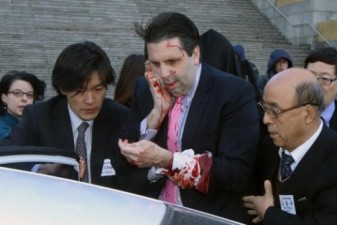
06/03/2015 09:19
‘US needs to end the Korean War’
Instead of sanctioning North Korea and exercising dominance over South Korea’s political establishment by stationing troops in the country, the US should turn a page and end the Korean War once and for all, Brian Becker from Answer Coalition told RT.
RT: A South Korean news agency reported that the suspect in attack on the US Ambassador to South Korea was opposed to the joint South Korea-US military drills launched earlier this week. Is he representative of the country's population?
Brian Becker: We don’t know anything about the details of this attack or this attacker. So it would be highly premature to make any sort of characterizations of him or what he did and why he did it. We do know that there is very intense sentiment both in North Korea and South Korea, and among overseas Koreans about the continued war exercises, so-called war games that simulate with the US and South Korea the invasion of North Korea and the destruction of North Korea.
These games - or they are not games, they are not funny - but these war exercises are the biggest the US conducts anywhere in the world, and they are considered highly provocative by North Korea. In South Korea the parliamentary opposition, Unified Progressive Party [UPP] - gives voice to the sentiment that the US should stop working with South Korea to carry out these war games - that party has been suppressed now by the South Korean government. Its leaders have been put into prison and sentenced to jail for 12 years, its parliamentary delegation [has] broken up. There is a blanket against all dissent right now in South Korea. So South Korea is becoming a pressure cooker. Whether it has anything to do with this individual, we don’t know.
RT: What reaction do you think is likely to follow from the US?
BB: Of course there will possibly be a blowback by those who are taking every opportunity to stop a rapprochement or an easing of tension between the US and North Korea. There are those again in South Korea who want discussions for reunification. That almost happened in 2000, the June 15 [North–South Joint] Declaration where was the beginning of a thaw after a half a century of conflict There aren’t many who believe that this is imperative for the Korean people as a whole. There are 10 million divided families. Whether this incident becomes a major political football or not - we don’t know. But as a peace activists and representing the people in the US who feel it’s time to end all these war exercises instead of sanctioning North Korea, instead of imposing harsh political repression on dissidents in South Korea, the US needs to turn a page and really end the Korean War once and for all.
RT: There are about 28,000 US troops stationed in South Korea as a deterrent against the aggression from North Korea. What is their role on the peninsula?
BB: The US has been in South Korea since 1950. The US invaded on June, 25. They attempted to wipe out North Korea, they launched the major offensive and that was pushed back by a combination of North Korean and Chinese troops in the late 1950. Since that time the situation has been frozen. Many progressive activists in South Korea feel that the US military presence, tens of thousands of troops a half of century later is not to protect South Korea from North Korean aggression, but to exercise dominance over South Korea’s political establishment and to maintain the US military bases in this very important part of Asia.
RT: It's not the first time a US ambassador has been in the line of fire. The American ambassador to Libya was killed in 2012 in Benghazi. Is this an attack on Washington’s foreign policy?
BB: Again, we don’t know enough of the motivations of the attacker or who the attacker is. We know very little because it’s only headlines provided by the South Korean police and the South Korean government. We do know, however, that US policy of invading countries, occupying countries, increases tension; it increases a cycle of violence. I don’t think we can directly link this at all to the Benghazi attack, it’s far different. But we do notice that when the US occupies 130 countries with 1000 military installations and keeps some counties divided as it has in the case of the Korean peninsula - that can only lead to heightened tension.








